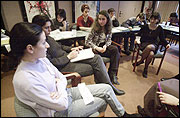 | | PAGE 1/A SECTION |
TODAY o March 22, 2001
|
 |
Teens from war-torn world learn to get along
Enemies in former Soviet republic regain trust
Saeed Ahmed - Staff
Thursday, March 22, 2001

Kimberly Smith / AJC photo
Teens from Georgia and Abkhazia participate in a role-playing workshop session to learn conflict mediation techniques at the Carter Center. |
During a break at a Carter Center workshop recently, 17-year-old Lasha Zantaria leaned over to share a
joke with fellow participant Archil Chochia. The teens burst out laughing, dabbing their eyes to wipe
away the errant tears that often accompany a particularly good chuckle.
From appearances, it was hard to guess that the two young men, both dressed in T-shirts and sneakers,
came from opposite sides of a bitter dispute that even three weeks ago would have made it improbable
for them to meet safely, let alone trade jokes.
"At first when we met, I thought, 'It will be impossible to make friends. We are considered enemies,'
" said Zantaria. "But then we learned to see that we were all the same, that we all wanted peace."
Zantaria is from Abkhazia, a one-time province of the former Soviet republic of Georgia. Until he was
forced to flee nine years ago, so was Chochia.
When Abkhaz separatists ousted Georgian forces from Abkhazian soil during a brutal 1992 civil war
and achieved de facto independence, 250,000 Georgians, including Chochia, were driven out of their
homes. An unstable stalemate has marked relations between the two people ever since.
Old wounds linger and ethnic violence flares on occasion. Resentment smolders on both sides.
Which makes it the all the more surprising for the two teens --- and 14 others like them --- to find
themselves getting along so well during their current trip to Atlanta.
The teens, all of whom have lost loved ones or been forced to flee their homes, are in Atlanta for a
conflict mediation program at the Carter Center that runs through Friday. The three-week program is
intended to teach them peace-building techniques they can use at home to build bridges between their
communities.
"The program has helped us to learn to trust one another again," said Sharidan Tirkba, a ninth-grader
from Abkhazia, and one of the youngest in the group of 16- to 18-year-olds. "And trust is the first step
toward peace."
That's precisely what the program hopes to accomplish, says Susan Nan, a senior associate of the
center's conflict resolution program and the brains behind the center's initiative.
"This program isn't about trying to achieve a political settlement to the conflict," said Nan. "It's about
initiating a grass-roots dialogue and developing relations so that when there is a settlement, these
participants can be a big part of the social groups that help realize and implement it."
Since Georgia considers Abkhazia a breakaway republic, not an independent country, it has imposed
sanctions severely limiting communication between the two groups. The teens grew up listening to
family members tell and retell personal stories of war that perpetuated the hostile perceptions the two
sides hold of each other.
To counter those impressions, the Carter Center program runs workshops in which the teens role-play
scenarios of conflict they are likely to encounter at home. The aim is to hone mediation and negotiation
skills and to cultivate understanding between the groups.
"In the beginning, there were some heated exchanges," said Nan. "It was difficult to create an
atmosphere that it was OK to have differences of opinion."
Since then, the participants have tackled increasingly more sensitive issues. But some subjects, such as
the cause of the conflict, are still considered too divisive and are left off the table.
That hasn't stopped the teens from focusing on the promise of the future.
"For centuries we have maintained friendly relations with our neighbors," said Zantaria, the Abkhaz. "I
don't see why we cannot let peace blossom between us again."
Before the 1992 civil war that tore through its hills for 13 months, Abkhazia, then a part of Georgia,
was known as the Soviet Riviera. Nestled between the Black Sea and the Caucasus mountains, it was
frequented by millions of wealthy tourists who came to enjoy its palm-lined beaches and subtropical
climate.
When the Soviet Union crumbled, the Abkhaz --- dissatisfied with being a minority in their own land
and never having gotten over the ignominy of being forcibly incorporated into Georgia by Stalin's regime
in the 1930s --- opted to become the one of the first independent states to rise from the post-Soviet
rubble.
The ensuing war was characterized by ethnic cleansing on both sides, with more than 10,000 deaths
and a mass exodus of Georgians. The result: a complete separation of Georgians and Abkhaz.
To this day, there's little common ground for a resolution. The Abkhaz demand sovereignty; Georgia
opposes it. Georgia wants the safe return of the displaced; the Abkhaz fear that would leave them a
minority again.
And negotiations between the two regions have oscillated between dialogue and deadlock.
Chochia, the 18-year-old Georgian, says it still pains him to think about the house and life his family
were forced to exchange for the cramped room in Tbilisi, Georgia, they now call home.
But he said he can't hold it against the Abkhaz teen he has been paired with for the home-stay portion
of the program.
"Staying with him at an American home has made me realize that he's no different from me," Chochia
said. "We enjoy the same movies and laugh at the same jokes."
"And if we can all get along in person," he added, "there is no reason why we can't along as a people."
|